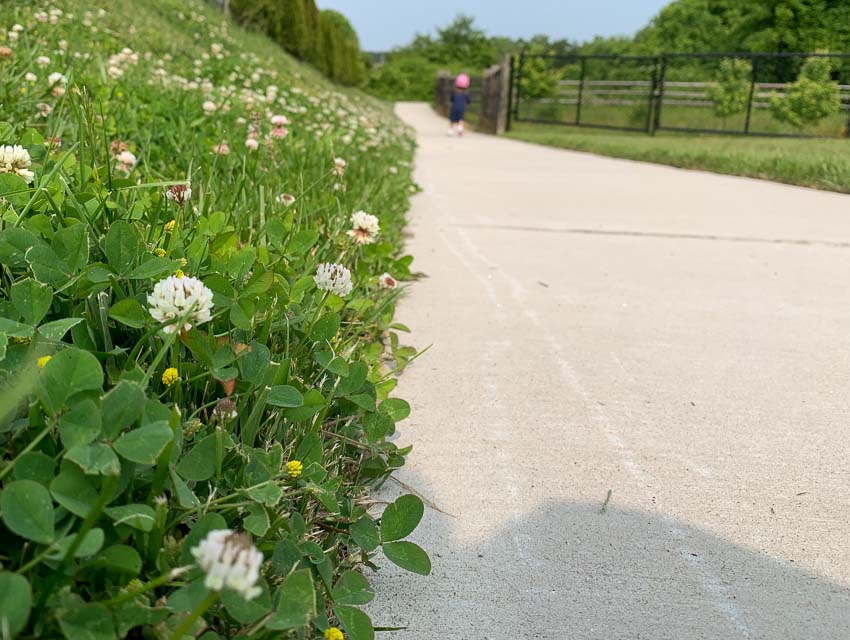A Guide to Effective Methods and Best Products
Four-leaf clovers are ancient symbols of good fortune, but you might not feel so lucky if you have clover in your lawn. Many clover species are considered invasive, and it can be tough to eliminate them from your yard. Find out how to kill clover in your lawn with this comprehensive guide.
Understanding Clover in Your Lawn
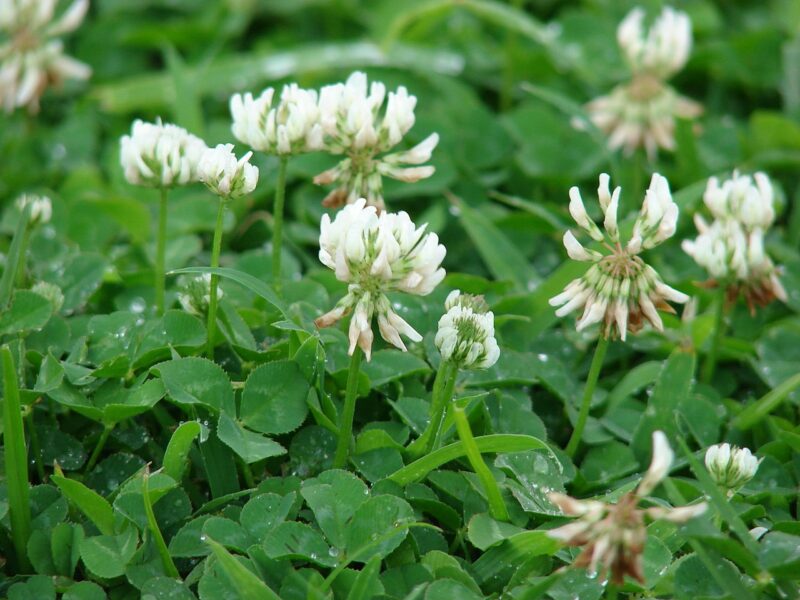
Lawn weeds are one of the toughest challenges for any yard enthusiast, and while clover is a beneficial plant that fixes nitrogen in the soil, only some people want it in their lawn.
The Pros and Cons of Clover
Clover supplies nitrogen to other plants and breaks up heavy soils, and it can be a beneficial addition to a lawn. It tolerates heat and drought, has pretty flowers, and grows quickly.
Clover also requires less mowing and watering than grass and helps create a biodiverse ecosystem in your yard by providing food and shelter for wildlife.
On the flip side, clover is an invasive species that can take over your lawn. While some people are switching to clover lawns, others like the look and feel of a 100% grass lawn.
Grass lawns have a tidier appearance, which can increase your home’s aesthetic and actual value.
Protect your lawn to the fullest! Learn how to get rid of grubs with our comprehensive guide!
Identifying Clover in Your Yard
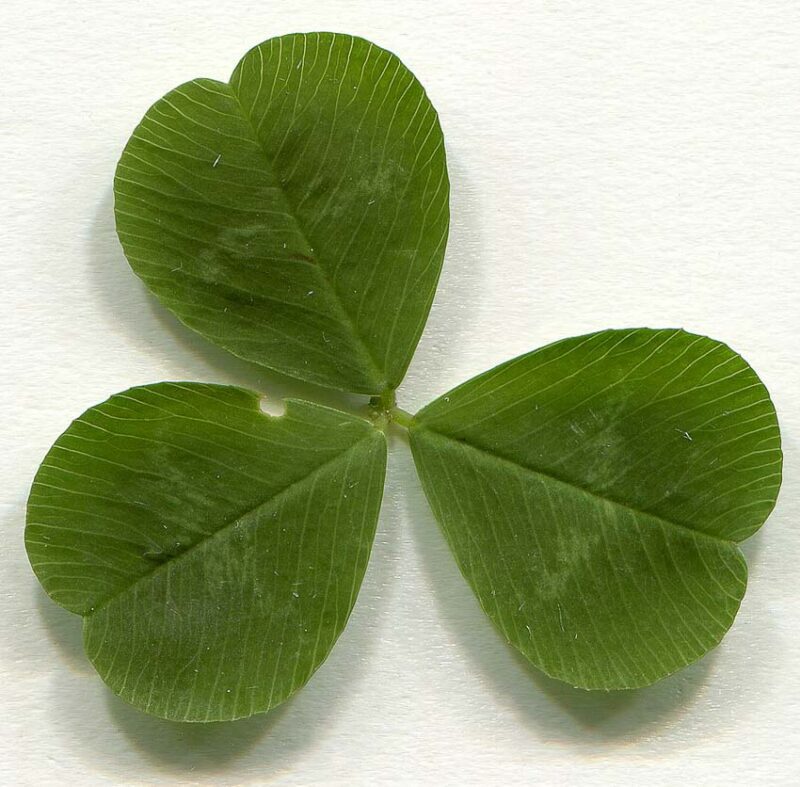
There are over 250 species of Trifolium, and like peas and beans, clovers are legumes in the Fabaceae family. The most common characteristic of clovers is the three leaflets arranged in a trefoil pattern.
Clover leaves are often dark green in color with white or red crescents or V-shaped markings on them, and both the leaves and the markings can present as reddish or purple.
Clover flowers are arranged on a stalk in a cluster, called an inflorescence, of about 40 to 50 individual florets. The most common types of clovers found in lawns are white clover and red clover, which are easily distinguishable.
White clover (Trifolium repens) is shorter and has round white flowers with a pink tinge, while red clover (Trifolium pratense) can grow as tall as 30” (80 cm) with dark pink inflorescences.
Why Clover Can Be a Problem
Not everyone values the benefits of clover in their lawn. After all, clover is an invasive species that can spread to other parts of your yard.
Clover can be a problem because it competes with native plants, threatening endangered wildlife species. Further, clover is more resilient than many lawn weeds, so it’s tough to eliminate.
Even though many people appreciate that clover attracts beneficial pollinators like honeybees and wasps, keeping clover out of your lawn is the smart thing to do if you’re allergic. There’s no better feeling than walking barefoot on the soft, cool grass; clover can ruin that if you’re prone to bee allergies.
As lawns have evolved over the past few centuries, people’s views on clover have changed. Lawns weren’t even popular in the United States until the late 1800s, and before World War II, lawn seed mixes included clover.
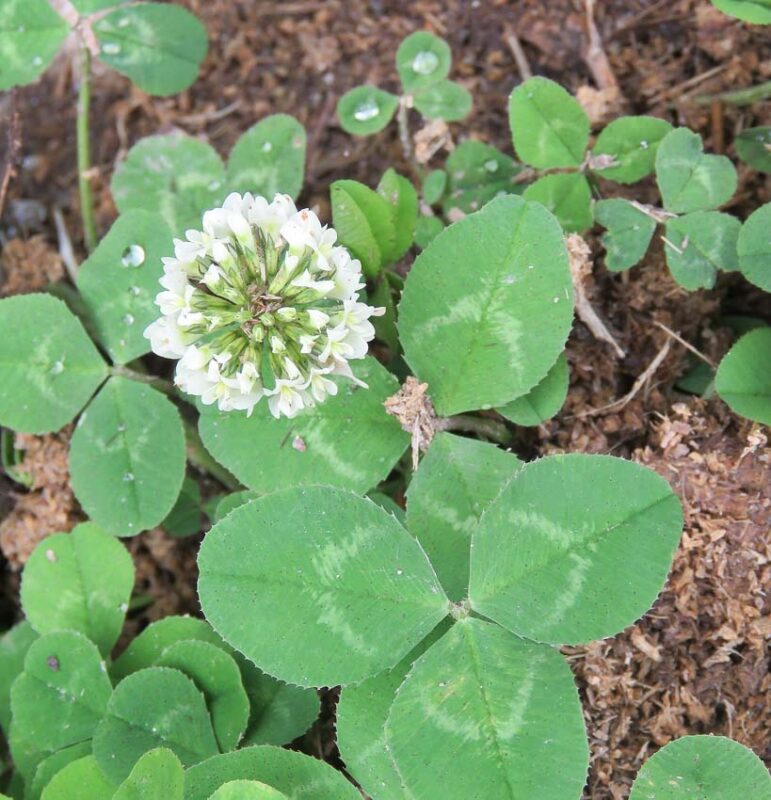
While clover is an invasive species, it is still an important forage and agricultural crop. Clover is somewhat of a paradox in lawns, and whether or not you decide to eradicate it from your lawn is a personal decision that nobody can decide for you.
How to Kill Clover in Your Yard
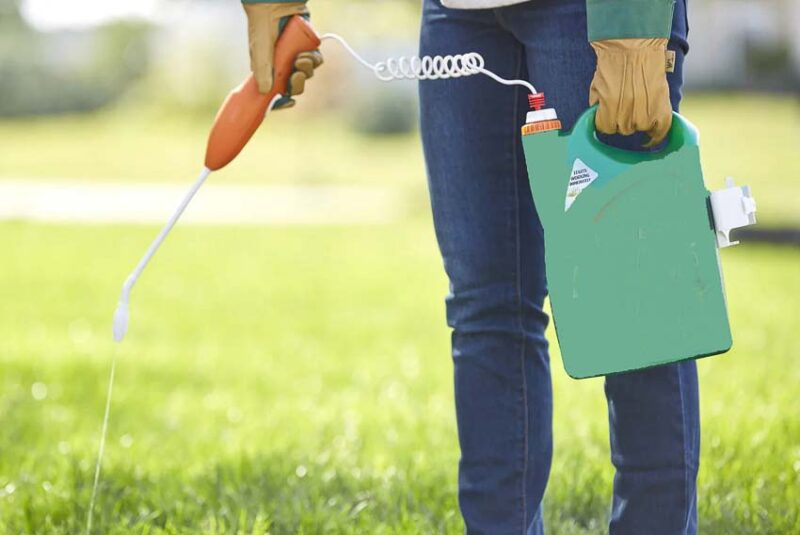
Like most weeds in your lawn, clover is a tough plant to kill. Thick healthy lawns can better resist weeds, but even the most well-maintained lawns can be afflicted with clover.
However, killing clover is possible using the right techniques.
Manual Removal Techniques
If you have a small patch of clover or an odd plant here and there, manual removal techniques are adequate and effective. Hand pulling can be labor and time intensive, though, so it’s not the best option for serious infestations, but there are other natural ways to kill clover.
Hand pulling
The easiest way to kill clover in your lawn is to eliminate it by hand. But get it when it’s small because, once it grows, it develops deep roots and can take over large parts of your lawn.
Here’s how to pull clover by hand:
- Water your lawn the day before you weed so the ground is moist but not too wet.
- Loosen the ground around the clover plant using a small spade, trowel, or hand-weeding tool. Wear gloves to protect your hands.
- When you pull the clover out, be sure to get the entire root system. Otherwise, it will sprout from the pieces of root.
Plastic garbage bag
If you have a small patch of clover that you need to kill, you can use a plastic garbage bag to kill it. However, plastic garbage bags on the ground will block out light and oxygen, and the black will heat the area to solarize it and kill everything, including the grass.
Then, you can reseed the area or patch it with sod.
Tilling and reseeding
Sometimes, it’s easier to start over with a newly planted lawn. However, if your lawn is over 50% weeds and bare spots, it’s time for a complete renovation.
You can reset your lawn without using harsh chemicals. The best way to redo your lawn is to wait for the best time to plant grass in your area and then kill your lawn using organic herbicides and polarization.
Then, it’s easy to till and replant.
Use an organic pre-emergent
Corn gluten is a byproduct of the corn milling process. It contains organic amino acid compounds called dipeptides that starve the roots of seedlings.
You can sprinkle corn gluten on your lawn to prevent weeds like clover, dandelion, and crabgrass from germinating. The best time to apply corn gluten on your lawn is when rain is forecasted in the next few days. Apply it to a moist lawn, then let the rain soak it into your soil.
Dish soap and vinegar
You can make a natural DIY herbicide with dish soap and vinegar to kill clover in your lawn. The acetic acid in vinegar is a powerful herbicide, and dish soap is used as a surfactant to make it more effective.
Add a tablespoon of dish soap to a gallon of white vinegar and use a pump sprayer to apply it to patches of weeds. You can dilute the vinegar with water, but it will be less effective.
It’s important to understand that vinegar is a non-selective weed killer. It will kill all plants indiscriminately, and because vinegar is only 5% acetic acid, you may need to apply it a few times.
You can also use a 75% solution of acetic acid, which is sold as an organic weed killer. However, it is very caustic, and you should apply it while wearing protective equipment.
Nitrogen boost
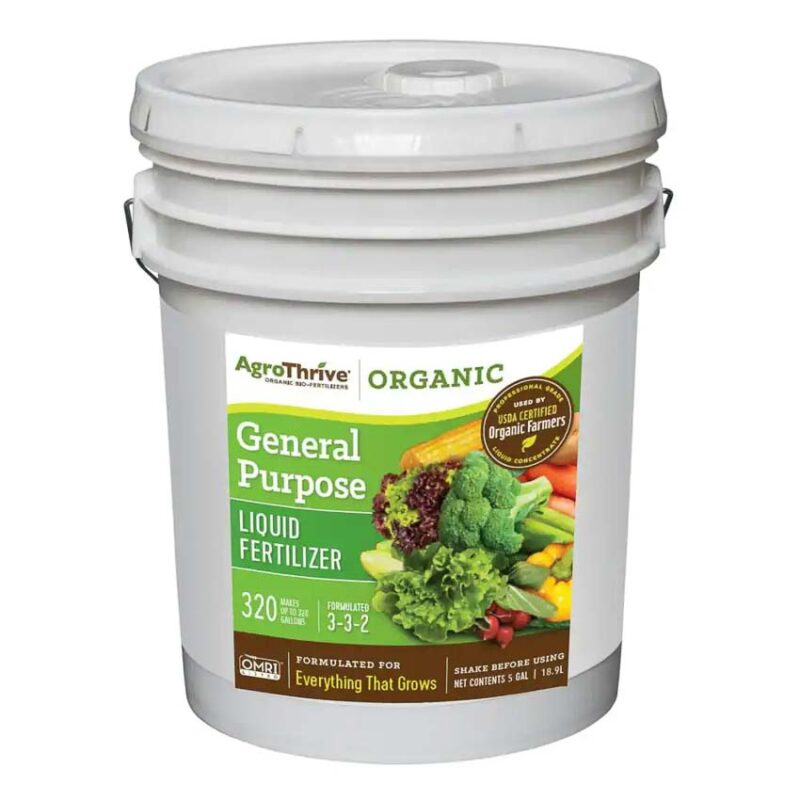
Using a hose-end sprayer, apply a liquid organic fertilizer like AgroThrive General Organic Liquid Fertilizer to give your grass a quick nitrogen boost. The 3-3-2 NPK ratio will provide enough nitrogen to encourage green growth, which can help your grass overcome the clover.
The best time for a quick pick-me-up like this is during the peak growing conditions, such as spring and early summer or early fall. Fertilizing in the middle of summer when your grass is dormant due to excess heat will worsen your weed problems.
Adjusting Lawn Care Practices
If you have an infestation of clover, you might need to adjust your lawn care practices to get rid of it.
Most lawn weeds are opportunistic, and they take advantage of grass when heat, drought, compacted soils, or heavy thatch weaken it. By keeping the grass in your lawn healthy, it will be able to crowd out tough lawn weeds like clover and dandelions.
Here are a few tips to help your grass grow stronger and block out weeds:
- Mow your grass tall–Small clovers like micro clover and Dutch clover thrive in closely shorn lawns.
- Water deeply–Healthy lawns have well-established root systems. For example, clover has deep roots, and your grass needs a fully established root system to compete with it.
- Fertilize–Clover thrives in poor soils, but grass does not, and with proper nutrients, your grass will endure the battle against clover. Learn how to fertilize your lawn to have a better chance against clover.
- Dethatch–If your lawn has over a half inch of thatch buildup, it’s time to dethatch it.
- Aerate–The roots of your grass need oxygen, and by aerating your lawn, you make it easier for grass plants to access nutrients in the soil. Aeration makes your lawn healthier and more able to resist weeds.
- Overseed–A dethatched and aerated lawn can look pretty thin, and unless you overseed it with new grass seed, lawn weeds like clover will take advantage of the opportunity to spread. Before overseeding, spread a thin layer of compost on your lawn to give the grass seedlings a head start.
Grass and clover have different preferences, and by catering to the grass, you will help it win the fight against tough lawn weeds.
Using Chemical Treatments
In the early 20th century, scientists began studying ways to control weeds with chemicals. When a selective chemical compound was discovered in the 1940s that could kill broadleaf plants without harming the grass, it started the herbicide revolution.
This discovery had the most significant impact on agriculture but also changed how homeowners grow lawns. Today, people can choose from various broadleaf herbicides to control the weeds in their lawns.
Best Clover Killer Products
Finding the best clover killer for your yard requires a little bit of research. Use these recommendations to get started.
Top Clover Killer Brands
Many excellent clover killers are available, but the most well-known brands are popular for a reason.
For decades, brands like Ortho, Roundup, and Spectracide have provided homeowners with quality weed killers. If you use a weed and feed product, Scott’s and Pennington are excellent brands offering various quality products.
Selective vs. Non-Selective Herbicides
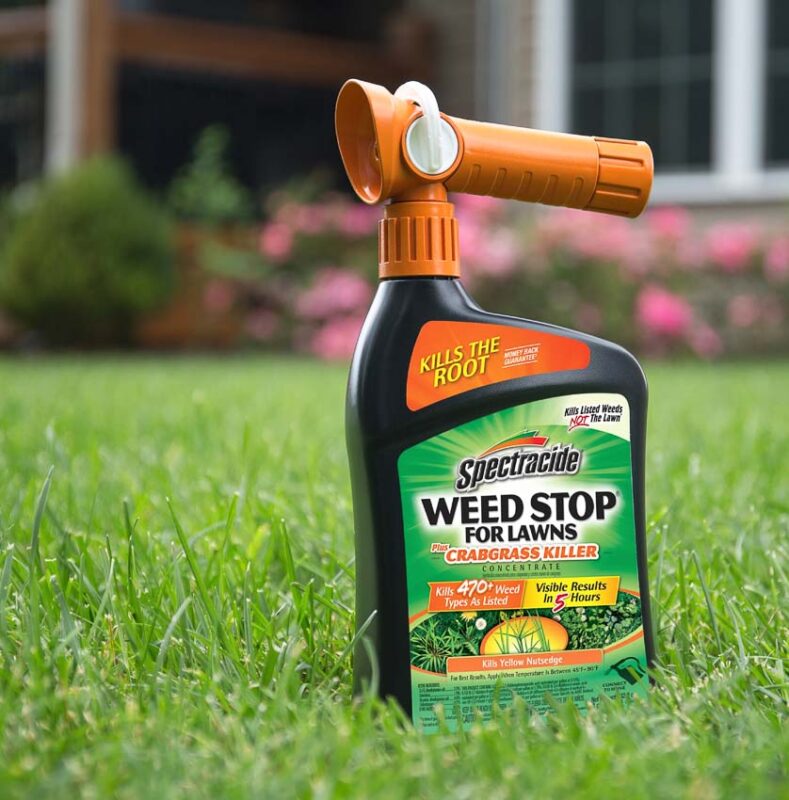
Organic post-emergent herbicides are not selective, meaning they don’t discriminate and will kill all plants, and they will quickly destroy a lawn. Many chemical herbicides are also non-selective, and you have to be careful when using them.
These are the best selective lawn weed killers for clover:
- Ortho Weed B-gon Chickweed, Clover & Oxalis Killer for Lawns
- Gordon’s SpeedZone Lawn Weed Killer
- Spectracide Weed Stop For Lawns Plus Crabgrass Killer

Non-selective herbicides work well for killing clover and other weeds in places like patios, driveways, and walkways. Spectracide Weed & Grass Killer Concentrate, Use On Driveways, Walkways, and Around Trees & Flower Beds, is a non-selective herbicide designed for this purpose.
Choose Green Gobbler 20% Vinegar Weed & Grass Killer for a more natural option.
Safety Tips When Using Clover Killers
Care is required when applying any type of weed killer, whether or not it’s organic. Always read and follow the safety instructions on the package, and wear the appropriate protective clothing and gear.
Showering immediately after applying herbicides and washing your protective clothing is a good idea.
Keep harsh chemicals like weed killers and fertilizers away from pets and children. After applying herbicides, wait at least 24 to 72 hours before letting kids and pets back on the lawn.
Will Clover Killer Hurt My Grass?
Clover killers for lawns won’t hurt your grass. Learn how to choose the right clover killer and apply it safely.
Choosing the Right Clover Killer for Your Lawn
There are many things to consider when choosing the right clover killer for your lawn. Consider the following when selecting the best herbicide for your yard:
Type of weed–Make sure the herbicide is designed to target the weeds in your lawn.
Application method–Herbicides are available as granular and liquid products.
Active ingredients–Double check the active ingredient and make sure that it will kill clover in your lawn. The most popular chemicals for killing clover are dicamba, clopyralid, fluroxypyr, and quinclorac.
Pre-emergent or post-emergent–Are you trying to prevent clover from germinating, or are you targeting established plants?
Contact your local cooperative extension office to learn more about herbicides and pesticides. Most extension offices have a professional weed manager who can answer your questions and may even offer classes in your area.
How to Apply Clover Killer Safely
Herbicides are more effective when applied on a dry, sunny day. The broad leaves of weeds will absorb more of the poison, and it will kill the plants faster. Avoid spraying when it’s windy because the drift can kill plants you don’t want to die.
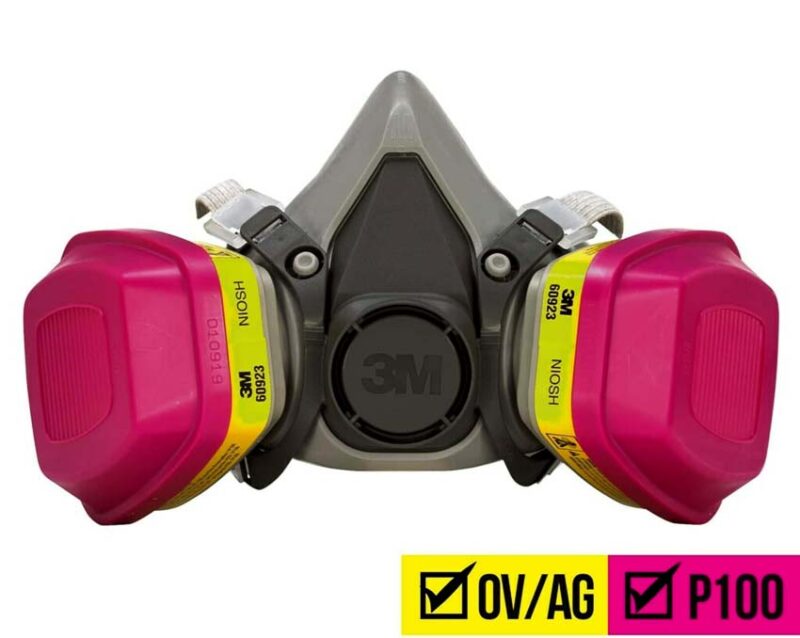
Handling harsh chemicals like weed killers should not be taken lightly. At the bare minimum, you should use protective clothing like gloves, goggles, and masks when mixing and spraying herbicides. Respirators and disposable suits like these offer better protection that’s well worth the price:
- Tyvek Disposable Suit by Dupont with Elastic Wrists, Ankles, and Hood
- Respirator Mask, Half Facepiece Gas Mask with Safety Glasses
Recovery Tips for Your Lawn After Treatment
Turfgrass isn’t completely immune to the effects of herbicide treatments. Even selective weed killers used in accordance with recommendations can harm your lawn. Avoid treating lawns that are already stressed by pests, diseases, or drought.
After treating your lawn with herbicides, resume your regular watering, mowing, and fertilization schedule. If your lawn was noticeably injured by herbicide treatment, whether because of improper treatment methods or because your grass was stressed beforehand, reduce the frequency of mowing and adjust the mowing height to mow higher for the next few weeks.
You can also give your grass a small boost of nitrogen fertilizer to help it recover.
Frequently Asked Questions about Killing Clover
What is the best time of year to kill clover?
Early spring is the best time to kill clover. However, you can use selective post-emergent herbicides on clover as soon as it comes up in the spring, then apply herbicides again in about six weeks.
How long does it take for clover killer to work?
It takes at least a week to 10 days to notice clover killer working. The first sign is a whitening of the clover plants. Some products take longer, so allow a minimum of three weeks for clover killer to work.
Can I use natural methods to kill clover?
There are many natural methods and homemade herbicides that you can use to kill clover.
Application of corn gluten as a natural pre-emergent works well to prevent weeds like clover, dandelions, and crabgrass from getting established in the spring. Most post-emergent herbicides are non-selective, so using manual removal methods to avoid killing your grass with organic herbicides is better.
Is it safe to use clover killer around pets and children?
Harsh chemicals like herbicides, pesticides, and fertilizers should be kept and used away from pets and children. After treating your lawn with any of these products, allow at least 24 to 72 hours before letting them back out to play in your yard.
Will Clover return after treatment?
Clover is a persistent weed that will return whenever it gets the chance. While broadleaf herbicides have a residual effect, they don’t last forever.

